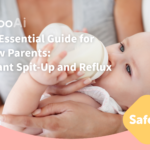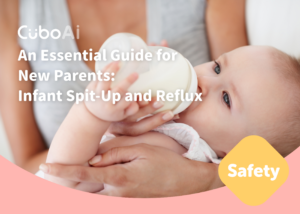Breastfeeding not only provides the child with nutrition but also physical closeness with the parent. For mothers, breastfeeding reduces the risk of Type 2 Diabetes and certain cancers such as breast and ovarian cancers. Some mothers also find it easier to return to their weight before pregnancy when opting to breastfeed. Conversely, breast milk provides all the nutrients in proper proportions to help protect the baby from allergies, obesity, sickness, diseases, and infections.
Most women are aware of the way breastfeeding affects their bodies, but few are prepared for what happens when you stop. You may experience both physical and emotional changes, but it is totally normal. Let’s take a look at what may happen to your body when you stop breastfeeding!
When should you stop breastfeeding?
Just as breastfeeding is a personal matter, stopping is also a personal choice. The American College of Obstetricians and Gynecologists as well as the American Academy of Pediatrics recommends breastfeeding exclusively for six months. This means no formula, water, or juice. After that period, the mother can decide whether to start introducing other foods to their baby.
In the process of weaning, it is completely up to you and your baby to decide when the right time is. For other babies, they decrease the number of times they breastfeed when they start to feed on solid foods. Once they are established on solids and can take at least three solid feedings a day, they start gaining the nutritional benefits from the solid food and begin to rely on them more for growth and health at around nine months.
How Will My Body Change After Weaning My Baby?

If breastmilk is your baby’s primary source of nutrition during the first year, they will need to be given an instant formula when you start weaning within less than a year.
While your family and friends may have strong opinions on the hows and whens of child-rearing and breastfeeding, weaning is your personal choice. Listen to your body and your baby. Remember that your body will go through changes not only in the physical aspect, but also in your overall health when you stop breastfeeding.
- Body shape – you will often find that there is a change in the shape of your breasts. Your breasts will get smaller again though this often takes several months. An article by the New Scientist describes the process of “molecular switch” that transforms your breast cells from milk-ejectors to cellular eaters as they start eating the dying cells, also called Phagocytosis. They may end up different in density and size before pregnancy, and it is completely normal. If you feel that they are too full, you can try using your hand or a pump to release the milk.
- Fertility – The chances of getting pregnant while breastfeeding is low, but it is still possible, especially six months after your baby is born or until you start getting your period again.
If you practice exclusive breastfeeding, you might not have your period the entire time. On the contrary, if you are not breastfeeding, your period will usually start again after six to eight weeks post-pregnancy. While it is difficult to ascertain when your period will return after breastfeeding the chance of ovulation will definitely increase. It is important to consult your doctor about contraception if you plan on not getting pregnant again or anytime soon.
Do hormones change when you stop breastfeeding?
Hormonal changes may happen when you stop breastfeeding. As you stop breastfeeding, your estrogen levels will start to rise. This is perfectly normal and most women experience it when they wean their baby. The effects may vary but some of the most common ones are mood swings, tender breasts (which can mean that your period is coming), nausea, or an increase in vaginal secretions.
Changes in Mental Health and Well-Being
Some mothers feel sadness, loneliness, or guilt when their babies stop nursing. It is not unusual to feel mildly depressed after weaning. Some mothers will feel irritable, anxious or have mood swings. However, these are usually short-term effects and will subside in a few weeks after weaning. If you start to feel severe symptoms that are affecting your quality of life for more than a couple of weeks, it is best to seek professional help.
- Mood changes – It is often believed that as you stop breastfeeding your body goes through a hormonal change which is the primary cause of mood swings during and after a full wean. There is actually some truth to it because as you stop breastfeeding there is a drop in prolactin and oxytocin levels.
Prolactin is a hormone required for milk production. This hormone also brings a feeling of relaxation, calmness, and well-being. Oxytocin, on the other hand, is the hormone required for milk ejection or more commonly known as the love hormone. Thus, the sudden decrease of both hormones is what causes that irritable and anxious feeling after weaning.
- Mental Health changes – The faster you stop breastfeeding, the more drastic you feel the changes in your body and the shift in your hormone levels. To prevent this from happening, it is recommended to take the weaning process slow.
More about mom’s mental health: Moms, It’s Time to Take Care of Yourself
How long after stopping breastfeeding do hormones return to normal?
On average, it usually takes two to three months for your hormone levels to return to normal. But as pregnancy and breastfeeding vary for every mom, the process of weaning is a reverse process of pregnancy. You are delivered back to yourself, albeit changed a little. Your body enters physiological processes for it to stop producing milk.
However, weaning can be a different experience for everyone much like menopause or PMS. Some mothers may start feeling the hormonal change as soon as they drop one or two feedings per week. Others may feel normal and have little symptoms that do not affect their daily lives. And still, others may still feel guilty about it even after years.
If you happen to experience this weaning guilt, remind yourself that you can always find other ways to bond with your child in place of the usual breastfeeding sessions. And don’t forget to take care of your overall health. You can jump back to exercising or eating balanced diets. You can talk to your friends, family, or therapist if you are struggling. Never underestimate your feelings of hopelessness and grief even if it’s temporary.

Regardless of how a mother feels emotionally, mentally, and physically about weaning and the changes that come with it, the best way to do it is gradually and gently. Never force yourself if you’re not yet ready to wean. Take a step back and sort out your thoughts, sometimes even if you are completely at peace with the thought of weaning, you can still go through mild or severe changes. It is important to take it slow, consider your child and never forget to be kind to yourself.
You might also like:
- A Must-Read for New Parents: Issues with Baby Spitting Up and Vomiting

- Navigating Baby’s First Doctor Appointment

- Guide to Understanding Baby’s Cough

- 3-Month-Old Sleep Regression: Ultimate Guide on How to Survive

- Transition Your Baby to One Nap: When & How to?

- What Happens To Your Body When You Stop Breastfeeding?






